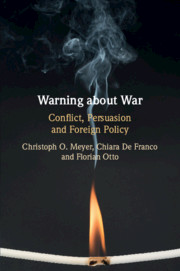Crossref Citations
This Book has been
cited by the following publications. This list is generated based on data provided by Crossref.
Ikani, Nikki
Guttmann, Aviva
and
Meyer, Christoph O.
2020.
An analytical framework for postmortems of European foreign policy: should decision-makers have been surprised?.
Intelligence and National Security,
Vol. 35,
Issue. 2,
p.
197.
Bressan, Sarah
and
Bergmaier, Aurora
2021.
From conflict early warning to fostering resilience? Chasing convergence in EU foreign policy.
Democratization,
Vol. 28,
Issue. 7,
p.
1357.
Fomin, Ivan
Kokarev, Konstantin
Ananyev, Boris
Neklyudov, Nikita
Bondik, Anzhelika
Glushkov, Pavel
Safina, Aliya
Stolyarova, Svetlana
Tkach, Dmitry
Vedernikova, Oksana
Yakovenko, Irina
Korobkova, Daria
Kovaleva, Daria
Kuzina, Ekaterina
Voronina, Darya
Chekov, Alexander
Sushentsov, Andrey
and
Wohlforth, William
2021.
International studies in an unpredictable world: still avoiding the difficult problems?.
European Journal of International Relations,
Vol. 27,
Issue. 1,
p.
3.
Juncos, Ana E.
and
Pomorska, Karolina
2021.
The Palgrave Handbook of EU Crises.
p.
553.
Gleditsch, Kristian Skrede
2022.
One without the Other? Prediction and Policy in International Studies.
International Studies Quarterly,
Vol. 66,
Issue. 3,
Beaumais, Louise
and
Ramel, Frédéric
2023.
Diplomats, Soldiers, and Armed Conflict Databases: Another French Exception?.
Global Studies Quarterly,
Vol. 3,
Issue. 2,
Gleditsch, Kristian Skrede
2023.
“This Research has Important Policy Implications…”.
Peace Economics, Peace Science and Public Policy,
Vol. 29,
Issue. 1,
p.
1.
Ikani, Nikki
and
Meyer, Christoph O.
2023.
The underlying causes of strategic surprise in EU foreign policy: a post-mortem investigation of the Arab uprisings and the Ukraine–Russia crisis of 2013/14.
European Security,
Vol. 32,
Issue. 2,
p.
270.
von Soest, Christian
2023.
Why Do We Speak to Experts? Reviving the Strength of the Expert Interview Method.
Perspectives on Politics,
Vol. 21,
Issue. 1,
p.
277.





